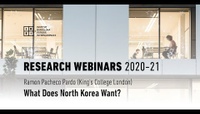Research Webinar | What Does North Korea Want?
Ramon Pacheco Pardo (King's College London)
Discussant: Robert Kissack (IBEI)
Available in video:
What does North Korea want? And how can the international community address Pyongyang's nuclear programme based on North Korean goals? Building on 15 years of research, I argue that North Korea has three key goals: normalization of diplomatic relations with the United States, the development of a nuclear deterrent to prevent regime change, and economic development to strengthen the Kim Jong-un regime. North Korea believes that achieving these three goals would put it in a strong position to secure regime stability, become a "normal" member of the international community, and approach inter-Korean reconciliation from a position of strength. Based on this understanding of North Korea's goals, South Korea, the United States, and the international community at large can decide what policies to adopt to address North Korea's nuclear build-up and to promote inter-Korean reconciliation to bring peace and stability to the Korean Peninsula. Above all, pressure in the form of sanctions and diplomatic isolation is unlikely to make North Korea decide to give up its nuclear weapons. A mixture of carrots and sticks, however, is likely to persuade Pyongyang to agree to an arms control regime, and to roll back parts of its nuclear programme. This means sustainable diplomatic engagement at different levels and addressing not only North Korea's nuclear programme, but also a peace regime for the Korean Peninsula and economic support for North Korea and ordinary North Koreans. It also means a careful and realistic plan to remove sanctions and promote diplomatic relations as North Korea takes steps down the road towards potential denuclearization. The international community, however, should understand that it will have to leave with a nuclear North Korea for years and decades to come.
Dr Ramon Pacheco Pardo is Reader (Associate Professor) in International Relations at King's College London and the KF-VUB Korea Chair at the Institute for European Studies of Vrije Universiteit Brussel (IES-VUB). He is also King's Regional Envoy for East and South East Asia, helping to shape and implement the university's strategy for the region. He holds a PhD in International Relations from the London School of Economics and Political Science (LSE). Dr Pacheco Pardo is also Committee Member at CSCAP EU. He has held visiting positions at Korea University, the Lee Kuan Yew School of Public Policy and Melbourne University. Dr Pacheco Pardo has been editor of Millennium: Journal of International Studies and currently sits in the editorial boards of East Asia: An International Quarterly, EU-China Observer and Global Studies Journal. His publications include the book North Korea-US Relations from Kim Jong Il to Kim Jong Un, published in 2019. He has participated in track 1.5 and 2 dialogues with South Korea, North Korea, China and Japan. Dr Pacheco Pardo has testified before the European Parliament and advised the OECD, the European External Action Service, the South Korean Ministry of Foreign Affairs, and the United Kingdom’s Cabinet and Foreign & Commonwealth offices. He is a frequent media commentator on North East Asian affairs and EU-East Asia relations.

